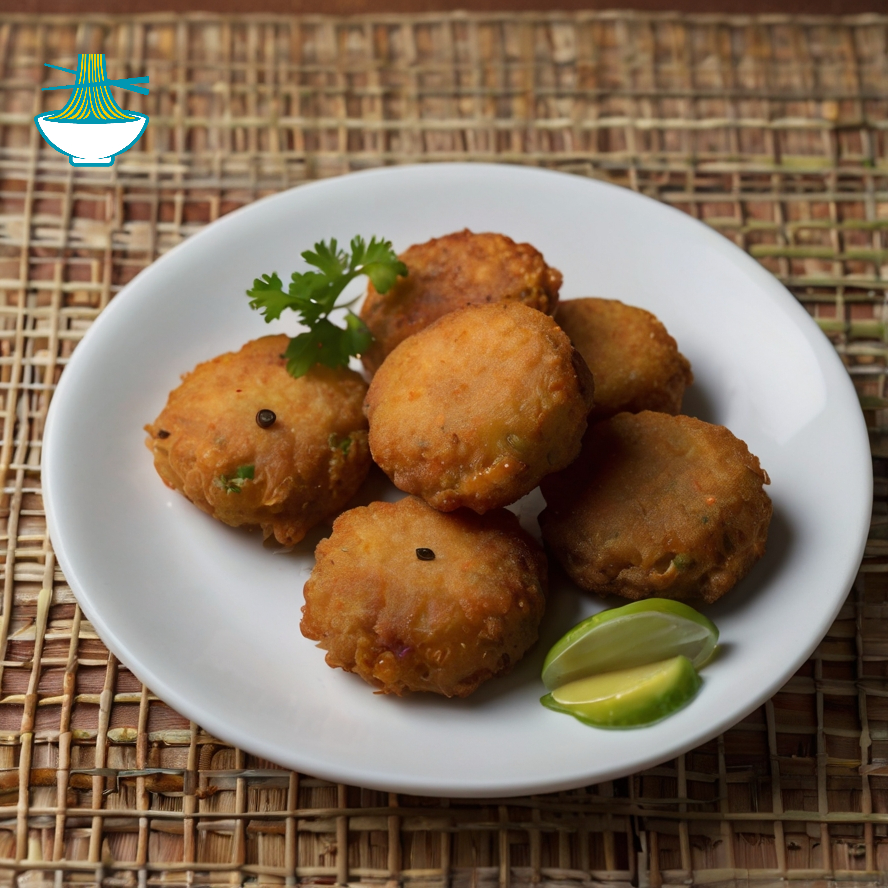Discover the authentic taste of Akara, a popular West African snack made from black-eyed peas, onions, and spices. This crispy and flavorful deep-fried bean cake is perfect for breakfast or as a savory snack. Follow this easy recipe to make Akara at home and enjoy a delicious, protein-packed treat that pairs perfectly with your favorite dipping sauce.
Ingredients:
- 2 cups dried black-eyed peas
- 1 small onion, finely chopped
- 1-2 fresh chili peppers, chopped (optional, for heat)
- 1 teaspoon salt (adjust to taste)
- 1 teaspoon ground pepper
- 1 tablespoon water (optional, if needed)
- Vegetable oil for frying
Instructions:
Soak and Prepare Beans:
- Rinse the black-eyed peas and soak them in water for at least 4 hours or overnight. Drain and rinse again.
- Rub the soaked beans between your hands to remove the skins. Rinse thoroughly until most of the skins are removed.
Blend the Mixture:
- In a blender, combine the peeled black-eyed peas, chopped onions, and chili peppers (if using).
- Blend into a smooth, thick paste. You can add a tablespoon of water if the mixture is too thick, but avoid making it too watery.
- Season with salt and ground pepper, then mix well.
Fry the Akara:
- Heat vegetable oil in a deep pan or pot over medium heat.
- Using a spoon, scoop the bean mixture into small portions and carefully drop them into the hot oil.
- Fry in batches until golden brown and crispy, about 2-3 minutes on each side.
- Remove and drain on paper towels to remove excess oil.
Serve:
- Serve Akara hot as a snack or for breakfast. Enjoy with your favorite dipping sauce or alongside bread or pap (a traditional African porridge).
Notes:
- For a smoother texture, you can pass the bean mixture through a sieve before frying.
- Akara is traditionally eaten in Nigeria and other West African countries.
Nutritional Values
Dried Black-Eyed Peas (2 cups)
- Calories: 330 kcal
- Protein: 23 grams
- Fat: 0.9 grams
- Carbohydrates: 60 grams
- Fiber: 8 grams
Benefits:
- High in protein and fiber, aiding in muscle building and digestion.
- Provides essential vitamins and minerals like folate, iron, and potassium.
- Supports heart health and helps regulate blood sugar levels.
Small Onion (1, finely chopped)
- Calories: 40 kcal per 100 grams
- Protein: 1 gram
- Fat: 0.1 grams
- Carbohydrates: 9 grams
- Fiber: 1.7 grams
Benefits:
- Rich in vitamins and antioxidants.
- Contains compounds that may help reduce inflammation and support cardiovascular health.
Fresh Chili Peppers (1-2, chopped, optional)
- Calories: 40 kcal per 100 grams
- Protein: 1 gram
- Fat: 0.4 grams
- Carbohydrates: 9 grams
Benefits:
- Boosts metabolism and adds heat to dishes.
- Rich in vitamin C and antioxidants, which support immune function and overall health.
Salt (1 teaspoon, adjust to taste)
- Calories: 0 kcal
- Sodium: High sodium content (about 2,300 mg per teaspoon)
Benefits:
- Enhances the flavor of food.
- Essential for maintaining fluid balance and nerve function.
Ground Pepper (1 teaspoon)
- Calories: ~6 kcal per teaspoon
- Protein: 0.3 grams
- Fat: 0.1 grams
- Carbohydrates: 1 gram
Benefits:
- Enhances flavor and may aid digestion.
- Contains piperine, which has antioxidant properties and may improve nutrient absorption.
Water (1 tablespoon, optional)
- Calories: 0 kcal
Benefits:
- Used to adjust consistency as needed.
Vegetable Oil (for frying)
- Calories: 240 kcal per 2 tablespoons
- Fat: 28 grams
- Saturated Fat: 3 grams (varies by oil type)
Benefits:
- Provides essential fatty acids and helps in cooking.
- Depending on the oil type, it can offer various health benefits, such as improved heart health from olive oil.


Comments